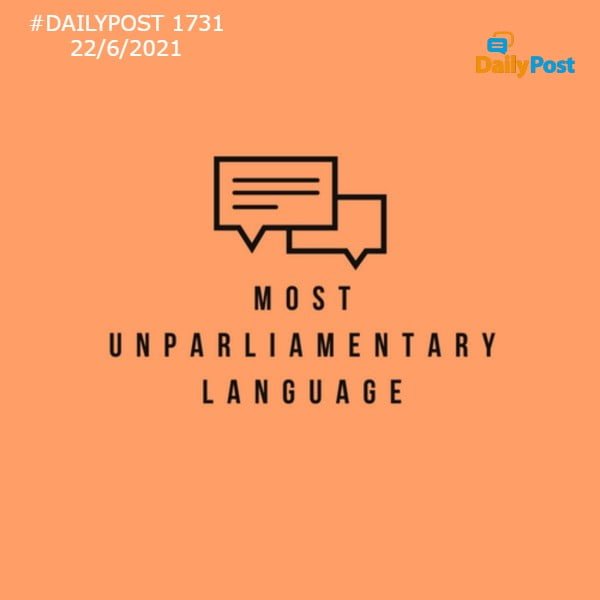DailyPost 1731
UNPARLIAMENTARY LANGUAGE
Bedlam has been a history and custom of our legislatures. It would be difficult to name all of them and also the worst of the lot. It keeps on going into depths which were not imagined ever. The masses and electorate have always criticized it, nonetheless, there is no chance of stemming the tide in the near future. Another similar malaise appears once in a while in the legislatures, is when unacceptable language from any civilized standpoint is used. This is called the unparliamentary language. Whatever might be the quality of debate, one thing we have to give to the credit to the Presiding Officers is that they deride such language and in case somebody crosses the limit, then such language is not taken on record of the parliamentary proceedings and the elected representative is reprimanded.
Should civilized language be the sole preserve of the legislatures? Do the elected representatives lose their charm outside of legislatures? Or is there a necessity of having different modes of language inside and outside of the legislatures.? Do we have any training on the parliamentary language to our parliamentarians and legislators? The general understanding of political perception is that it is totally indifferent to the quality and content of the language used by the elected representatives. Some odd negative remarks by the Presiding Officers is not a matter of grave concern to them. There has never been any meeting of political parties on this issue. Politicians bask in glory of being very deft communicators, for whom and for what purpose is the question mark.
The language used in rabble rousing, public elections, during communal flare ups, in upping the ante of communal flare ups, at times in caste related issues are all well known. The language of politics would be the most questionable in comparison to any other professional group. Whether to call them a professional group can be a matter of yet another debate. Challenging the political rivals of dire consequences through criminal cases, if the party comes to power, we don’t know whether it’s parliamentary language or not. Mimicry or calling names with base level sarcasm would certainly fall in the category of unacceptable language. But it keeps going on. So to say, it has become the lingua franca of political discourse.
By far the frequency of language misdemeanours by legislators / parliamentarians, and spokespersons on the mainstream electronic media seems to have crossed all bounds. Everyday, social media is full of video clippings generated out of these debates, which are used to titillate base political egos. These crash debates put the Indian democracy to shame. It gives a feeling that their masters feel happy with such a performance and that is the only reason this soap opera goes on in full swing. In social media too, we at times have unparliamentary outpourings by our legislators. Does a vibrant democracy not presuppose civilized language? Is not the quality of political debate and discourse in a democratic country directly proportional the quality of language?
A CIVILISED DEMOCRATIC LANGUAGE IS A NECESSITY, BOTH INSIDE AND OUTSIDE OF LEGISLATURES.
Sanjay Sahay

